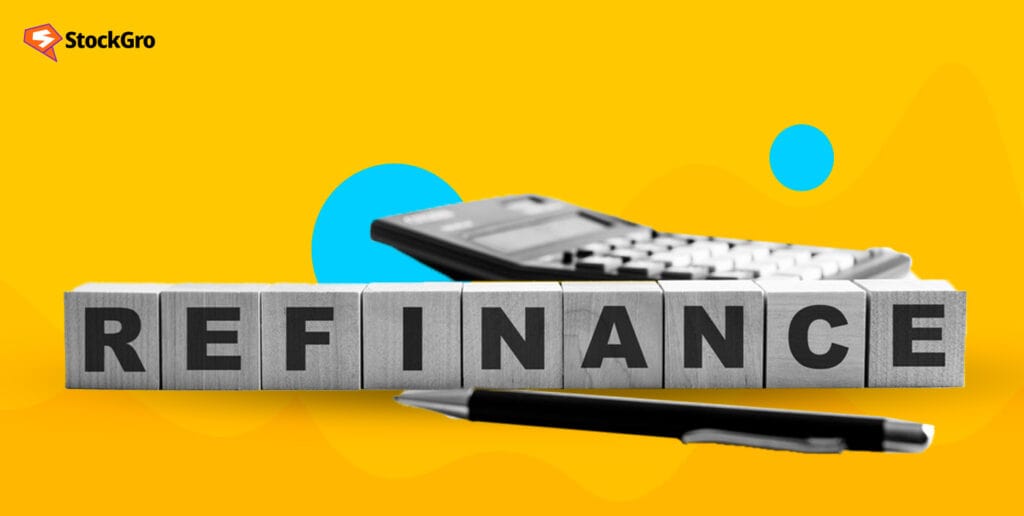
Refinancing your loans is a fantastic technique to pay off current debt at a more favorable rate of interest. But are you aware that a personal loan can also be refinanced? Refinancing conjures images of larger debt, like a house loan or school loan. However, if you’re hoping for improved terms for repayment, personal loans can also be refinanced. By considering a home loan calculator or a personal loan calculator, you can estimate the impact of refinancing options on your monthly payments and overall interest. So, let’s discuss refinancing personal loan into home loan in detail.
What does refinancing a personal loan mean?
To apply for a new loan from the same financial institution or other with the purpose of using the money obtained to pay off your previous debt is the process of refinancing a personal loan. You’ll start your loan payments under the new conditions and interest rate only after the deal is closed.
Refinancing a loan can be done for various reasons. However, the main purpose is to get lower interest rates during the process. On rare occasions, people refinance their loan in order to increase the amount of the loan just to cover a new expense or any other financial obligation.
You may also like: Simplify your financial life with debt consolidation: A complete guide
Benefits of refinancing a personal loan
- Reduced interest rates
One of the primary advantages of refinancing is the opportunity to receive a lower interest rate. If you replace your current loan with a new one that has better terms, you could save a significant amount of money throughout the loan’s term.
- Lower monthly instalments
An interest rate reduction might result in a decrease in monthly installments or EMIs. With more reasonable payments, you may better balance your budget and free up cash for other essential expenses or savings goals.
- Improved credit score
Does refinancing a personal loan hurt your credit? By consolidating multiple loans into one or simply demonstrating a consistent repayment history, you can boost your creditworthiness for a personal loan. The reason is healthier credit score opens doors to better financial opportunities in the future.
- Flexible repayment terms
With refinancing, you can design your loan according to your needs. Whether you wish to extend the repayment period for lower monthly payments or shorten it to pay off the loan sooner, you have the liberty to choose what will suit you. You are the boss of your finances.
- Access to additional funds
In some cases, refinancing can also offer access to additional funds. This can be particularly beneficial if you have other important financial obligations or if you’re looking to make a big purchase.
Steps to refinance a personal loan
Applying to the lender is possible once you have determined all the information you require regarding the fundamentals, such as the terms of the new loan and the interest rate on refinancing. The steps are as follows: –
- Determine your needs
Assessing your borrowing needs is the first step in the loan refinancing procedure. By doing so, you can make sure you don’t take more than is necessary. You have to pay back more of what you borrow, regardless of the increased interest rate. It is, therefore, advisable to exercise caution and perform a thorough computation.
- Talk about it with your present lender.
It could be wise for you to speak with your existing lender to see if they are open to negotiating the terms of your loan and providing you with a better deal than what you are now receiving before moving forward with a contract with a new bank.
They might possibly keep you if you have been a consistent, dependable customer for a long time with a clean payment record. Even if you decide to switch lenders, you can discuss with them the potential for a prepayment penalty to be waived.
- Select a new lender carefully.
You can start looking for a new lender if you’re not happy with the one your current bank or financier is offering. Don’t forget to compare interest rates, loan terms, and additional perks. Before deciding on a few choices, you can evaluate the different lenders in your city by conducting an internet search.
Once you’ve narrowed down your alternatives, go drop by their offices or give their customer service lines a call to find out what kind of assistance you can receive. Additionally, you can peruse a few web testimonials on the nature of other clients’ interactions with the lender.
- Verify your credit rating.
Make sure your credit score is high before applying to refinance your loan. A strong credit score will ensure that your application is processed without any problems.
- Apply for a loan refinancing.
Once everything is in place, apply for your new loan without delay. You may now apply online for personal loans from a lot of companies. You can fill out your application in person at the bank’s office if you need some assistance with filling it out and organizing the paperwork.
Also Read: The hidden costs of freedom: Foreclosure charges on personal loans
Cons of refinancing personal loans
- Extended loan term
Refinancing can extend the time it takes to pay off your loan. While this might lower your monthly payments, it means you’ll end up paying more in interest over the life of the loan.
- Additional fees
Be aware of any fees associated with refinancing, such as origination fees or prepayment penalties. These extra costs can eat into any potential savings from a lower interest rate.
- Impact on credit score
Can refinancing personal loans with bad credit? Yes, each time you apply for a new loan, it can temporarily affect your credit score. Additionally, closing out an old loan and opening a new one can also affect your credit history and overall score.
- Risk of variable rates
If you refinance from a fixed-rate loan to a variable-rate loan, you could be exposed to fluctuations in interest rates. This means your monthly payments could increase if rates go up.
- Loss of benefits
If your original loan came with perks or benefits, such as loan forgiveness options or deferment, refinancing could cause you to lose those advantages.
Also Read: Unsecured loans: How does it impact the borrower?
The Bottom Line
Refinancing using personal loans can be a great option for individuals struggling with high-interest debts. It allows you to simplify your payments, reduce your interest rates, and have more control over your finances. However, it’s important to carefully consider your financial situation and compare offers from different lenders before making a decision.

